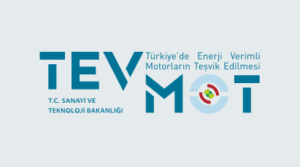As the Promoting Energy-Efficient Motors in Small and Medium Sized Enterprises (SMEs) in Türkiye (PEEMS, or TEVMOT to give it its official abbreviation in Turkish) project draws to the conclusion of its pilot programme this year, Özge Renklidağ, the Project Manager from the United Nations Development Programme (UNDP) Türkiye, reflects on the background and outcomes of the project.

The USD 33.29 million project is being implemented by the Directorate General for the Strategic Research and Productivity (DGSRP), under the Ministry of Industry and Technology (MoIT), with financial support from the Global Environment Facility (GEF) and in cooperation with UNDP. Technical assistance is provided by the United Nations Environment Programme United for Efficiency (U4E) initiative. The project will contribute to Türkiye’s Intended Nationally Determined Contributions commitment to reduce its greenhouse gas emissions by 21% from the business-as-usual level by 2030 and is being implemented as part of Türkiye’s Strategy on Energy Efficiency.
Since its inception in 2017, the project has focussed on:
- Strengthening the legislative, regulatory and policy framework for energy-efficient motors.
- Capacity building for relevant stakeholders to promote the benefits of energy-efficient motors.
- Upgrading the Turkish Standards Institution test laboratory and strengthened monitoring, verification and enforcement.
- Launching and scaling up a “one-stop-shop” sustainable financial support mechanism.
- Enhancing knowledge management and monitoring/evaluation and the public awareness for energy-efficient motors.
Drawing on the strength of the collaboration between the wide range of stakeholders involved, including the T.R. Ministry of Energy and Natural Resources, Turkish Standards Institution, Ankara Chamber of Industry, Istanbul Chamber of Industry, Electric Motor Industrialists Association (EMOSAD), Energy Efficiency and Management Association (EYODER), AEMOT Elektrik Motor Sanayi A.Ş., WAT A.Ş., GAMAK Makina Sanayi A.Ş., VOLT Elektrik Motor San.Tic. A.Ş., the project has had some significant achievements:
- Transposition of EU Regulation 2019/1781 on eco-design requirements for electric motors and variable speed drives was completed. The new regulation was put into effect in 2021 in parallel with the EU regulation and relates to 50 Hz and 60 Hz, 2 to 8 pole, induction electric motors with a rated power output between 0.12kW and 1000kW, and variable speed drives with a three-phase input.
- The development of a recycling programme under the pilot replacement programme, which is operating in seven of Türkiye’s organized industrial zones (OIZs).
- The upgrade of the Turkish Standards Institution through 1.2 million USD project funding, and the demonstration product testing programme for electric motors with the enhanced testing capacity were completed.
- Delivery of technical capacity building training, focused on motors systems inspection methodology, to the relevant stakeholders including the OIZ’s Energy Management Units, Energy Efficiency Companies (EVDs) and manufacturers.
- Delivery of walk-through and detailed energy audits in 100 beneficiary SMEs in the seven pilot OIZs using a standard motor testing report and motor efficiency investment plan (MEEIPs) developed by the project.
- One-to-one meetings with the 100 beneficiary SMEs, to make them aware of the energy savings potential identified as a result of their audit, and to increase their awareness of global climate change and energy efficiency.
- Launch of the KOSGEB (Small and Medium Enterprises Development Organization of Türkiye) Energy Efficient Electric Motors Replacement Support Programme – a two-year pilot programme which came into force in January 2020. It has provided grant support to the 100 beneficiary SMEs in the seven OIZs during the pilot implementation phase. KOSGEB provides a co-financing contribution to the programme.
- 363 motors were replaced in 48 SMEs during the pilot project, achieving about 1.5 GWh/year energy savings and a reduction in greenhouse gases of 685 tonnes of CO2-equivalent. The types of the new electric motors replaced are AC (alternative current) squirrel cage induction motors with rated power output between 4 kW and 200 kW ranging from IE3 to IE4 efficiency class with 2 to 8 poles. The majority of the preferred new motors are domestic products. Implementation of the pilot programme has nearly completed, and the project activities will continue with a dissemination phase for sustainability of the energy efficiency in electric motor driven systems.
- Communications activities, including development of the TEVMOT website, www.tevmot.org.tr, and publication of a quarterly e-bulletins which serve as a repository for all promotional and technical information regarding the advancement and promotion of energy efficient motors in the industrial sector in Türkiye; the production of short video case studies to promote project success stories; publication of a guide on recycling of inefficient motors .
In the final stages of the project, further capacity building technical training will be conducting for the relevant stakeholders focussing on measurement and verification activities and the motor replacement activities will be scaled up to a wider number of SMEs in Türkiye through the KOSGEB financial support programme. The project will continue to carry out campaign awareness raising activities targeting SMEs and other relevant stakeholders in the sector, including the production and dissemination of additional video case studies promoting successful SMEs.
For more information on the project, contact Özge RENKLİDAĞ, UNDP Project Manager, at ozge.renklidag@undp.org.